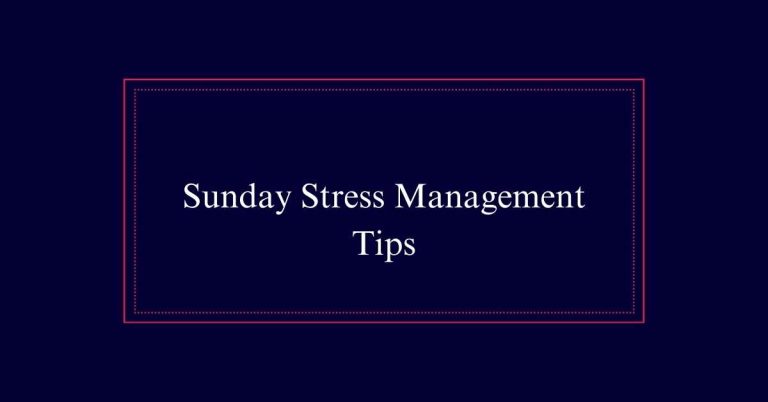5 Ways to Stop Having a Bad Day
Don’t let a bad day bring you down. Take deep breaths to calm yourself and try the 4-7-8 technique. Embrace setbacks and find humor in challenges. Speak kindly to yourself; turn negative thoughts into positive affirmations. Write in a journal to relieve stress and understand your feelings better. Label your emotions to make them less overwhelming and gain control.
Practice Calming Breathing Techniques
Taking a few deep breaths can help you calm down quickly. Try the 4-7-8 breathing technique: inhale for 4 seconds, hold for 7 seconds, and exhale for 8 seconds.
Find a quiet place where you can focus on your breathing. Notice your heart rate and muscles. Are they tense? Breathing exercises from yoga or meditation can help. These methods let you relax and center yourself.
Pay attention to how your body feels. When you practice these techniques, you’ll feel more relaxed and in control. Consistent practice can make these exercises a natural response to stress.
Develop Effective Coping Strategies
To handle a bad day, accept that setbacks happen to everyone and focus on moving forward.
Start by acknowledging your feelings instead of resisting them. Share your struggles with someone you trust; talking can lighten the emotional load.
Find humor in difficult moments to help shift your perspective. Remember, it’s okay to let go of things you can’t control. Embrace life’s imperfections and understand that challenges are part of the journey.
When you lean into these tough situations, you build resilience and learn valuable lessons. Take small steps to move past the negativity. Each action you take helps you regain control over your day.
Keep going, knowing that better times are ahead.
Engage in Positive Self-Talk
Reframe negative thoughts into positive affirmations to boost your mood. When you catch yourself thinking negatively, stop and change those thoughts to something positive.
Instead of saying, “I can’t do this,” tell yourself, “I’ll try my best and learn from this experience.” Be kind to yourself. Avoid self-criticism and remember that everyone makes mistakes.
Practice self-compassion by speaking to yourself like you’d to a friend. Challenge unhelpful beliefs and replace them with empowering statements like, “I am capable and strong.” Recognize your resilience and intelligence, especially during tough times.

Encourage yourself with supportive and motivating words. This positive self-talk can help you feel more confident and improve your overall day.
Utilize Journaling for Stress Relief
Another effective way to manage stress is by keeping a journal. When you write down your thoughts, you can break the cycle of worrying.
Journaling helps you understand and accept your feelings better. It’s a way to reflect on tough situations and think about possible solutions. By putting your emotions on paper, you gain clarity and insight into your mind. This process can make you feel more in control and less overwhelmed.
You don’t need to write perfectly; just let your thoughts flow. Over time, you’ll notice how it helps you process difficult experiences and find closure.
Manage Emotions With Language
Have you ever noticed how putting your feelings into words can make them less intense? When you label your emotions, you shift your mind away from stress. Saying ‘I feel angry’ or ‘I feel sad’ can actually calm your brain.
This happens because naming your feelings activates your prefrontal cortex, which helps you think clearly, and calms the amygdala, which handles stress. By describing what you feel, you can manage your emotions better.
It’s like giving your feelings a name takes away their power. So next time you’re overwhelmed, try saying what you feel out loud or writing it down. You’ll find it easier to handle your day and keep those bad feelings in check.
Frequently Asked Questions
How Can Physical Exercise Improve My Mood on a Bad Day?
Physical exercise boosts your mood by releasing endorphins, which are natural mood lifters. It reduces stress and anxiety, improves sleep, and increases energy levels. A quick workout can make you feel happier and more relaxed.
What Role Does Nutrition Play in Managing Stress and Bad Days?
Nutrition plays a big role in managing stress. When you eat balanced meals, you support your body’s needs. Avoid too much sugar and caffeine. Choose foods rich in vitamins and minerals to help stabilize your mood.
How Can Spending Time in Nature Help Alleviate a Bad Mood?
Spending time in nature can lift your mood. Fresh air and natural surroundings help reduce stress and anxiety. Take a walk in a park or garden, and you’ll feel more relaxed and refreshed.
What Are Some Quick Ways to Distract Myself From Negative Thoughts?
Take a walk, listen to music, or call a friend. Focus on a hobby or watch a funny video. Shift your attention to something enjoyable or productive. Keep yourself busy to stop dwelling on negative thoughts.
How Can Connecting With Friends or Family Improve My Emotional State?
Connecting with friends or family boosts your mood by providing emotional support. You share laughs, feel understood, and get advice. Their presence reminds you that you’re not alone, making you feel happier and more secure.






